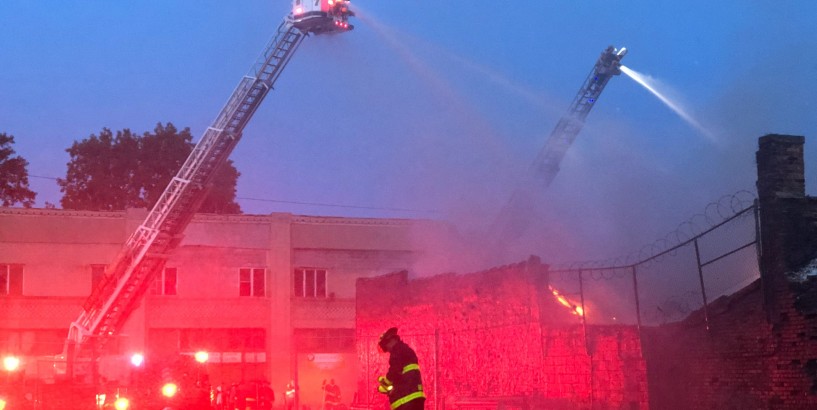Fire has claimed the building that once housed the Gold Dollar, the Cass Avenue bar where the White Stripes played their first show and other bands cut their teeth in the late '90s as Detroit's garage-rock phenomenon took flight. The Gold Dollar closed in 2001 after a five-year run, and the property at 3127 Cass was reportedly purchased by the Ilitch organization in 2015 as the company acquired properties in the area around Little Caesars Arena. Deputy fire commissioner David Fornell said the fire was "fully involved" when firefighters arrived on the scene after 8 p.m. They were still fighting the blaze at 10 p.m. "We don't know what happened," he said. "The building has been vacant for many, many years. We've had fires in this building before." Power and gas services at the building were shut off six years ago, Fornell said. It's too soon to determine the cause of the fire or speculate about arson, he said. It was 22 years ago this month that the little-known White Stripes took the stage for the first time at the small, dank Gold Dollar, where Meg White's sister worked as a bartender. The performance was the first of many Gold Dollar gigs for the band during the next year, as Jack and Meg White worked out the sound, look and creative philosophy that would make eventually bring them global success. "All right,” Jack White told the small Monday night crowd on July 14, 1997. “We get to bore you for two or three songs.” The nine-minute set was recorded through the venue's soundboard and released two decades later by White's Third Man Records. "I was at the first two White Stripes shows and the majority of the fans were outside the Gold Dollar while they were playing," musician and label operator Dave Buick recalled to the Free Press in 2003. "There were maybe 20 or 30 people when they went on. They played (there for the next) year, they were always first out of three (bands), and there’d be hardly anyone there — me and a few people." Operating outside the city's mainstream music channels, Neil Yee's Gold Dollar was a prime spot for a host of Detroit bands — the Hentchmen, the Sights, the Go, the Detroit Cobras, the Trash Brats and others — as well as touring acts of the punk, garage and hard-rock variety. Along with the Magic Stick up Woodward, it was a prime breeding ground for the surge of Detroit garage rock that captured much of the music world's imagination in the early 2000s. "The Gold Dollar was once a drag-queen bar. It (was) a tiny place. The room was so small — it felt like you could only fit about 50 people in there," the Go's Bobby Harlow told the Free Press in 2003. "It was sweaty, late-night, after-hours. There weren’t bouncers. No one was shoving you out of the door. The stage was small — the audience was packed right up there. It was loud as hell. It was total abandon there. Hands down, the best bar in Detroit." The litany of local bands on the Gold Dollar stage was long and rich: the Dirtbombs, Bootsey X & the Lovemasters, Rocket 455, the Wildbunch (now Electric Six) — all plying their own distinct brands of Detroit rock, but bonded by a common cause. Two members of Ohio's Greenhornes — a band that was a Gold Dollar regular — joined Jack White and Brendan Benson years later to form the Raconteurs, now on a North American comeback tour. "There were a lot of good bands around at the same time, and we all wanted to play with each other. We weren’t interested in opening up for national acts," said the Detroit Cobras' Mary Restrepo. "We really liked each other. We collected each others’ 45s. We were in love with each other." The Gold Dollar's allure derived in large part from its sketchy locale. Long before developers set their sights on the neighborhood, the Cass site came infused with a gritty authenticity. "People didn’t see the Gold Dollar during the daytime. It was scary as (expletive)," Restrepo said. "I remember the first time I realized how bad it looked: A band from Italy was here. The guy saw where they were playing, and laid down in the car. And you couldn't blame him. It looked like a big abandoned building. There were a lot of dopers around. But therefore, you had a lot of freedom at night — you could do what you wanted to do. There was no hassle from the man." The Cass Corridor, a hub of artistic activity for many decades, has been transformed in recent years as Detroit development activity escalates, including the Ilitches' increasingly scrutinized District Detroit plans . The Gold Dollar fire, said Restrepo, "seems apropos." "It can never come back," she said. "It almost seems appropriate that it has to go to like this." Contact Detroit Free Press music writer Brian McCollum: 313-223-4450 or bmccollum@freepress.com. Kathy Kieliszewski of the Free Press contributed to this report.
© 2024, Copyrights gulftimes.com. All Rights Reserved









